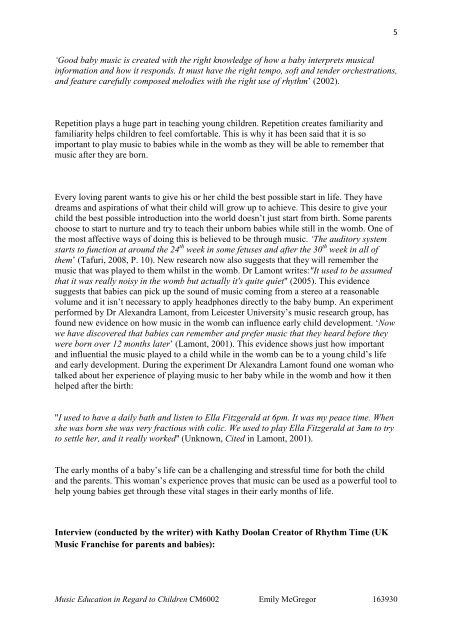What are the advantages and disadvantages of a musical education ...
What are the advantages and disadvantages of a musical education ...
What are the advantages and disadvantages of a musical education ...
You also want an ePaper? Increase the reach of your titles
YUMPU automatically turns print PDFs into web optimized ePapers that Google loves.
‘Good baby music is created with <strong>the</strong> right knowledge <strong>of</strong> how a baby interprets <strong>musical</strong><br />
information <strong>and</strong> how it responds. It must have <strong>the</strong> right tempo, s<strong>of</strong>t <strong>and</strong> tender orchestrations,<br />
<strong>and</strong> feature c<strong>are</strong>fully composed melodies with <strong>the</strong> right use <strong>of</strong> rhythm’ (2002).<br />
Repetition plays a huge part in teaching young children. Repetition creates familiarity <strong>and</strong><br />
familiarity helps children to feel comfortable. This is why it has been said that it is so<br />
important to play music to babies while in <strong>the</strong> womb as <strong>the</strong>y will be able to remember that<br />
music after <strong>the</strong>y <strong>are</strong> born.<br />
Every loving p<strong>are</strong>nt wants to give his or her child <strong>the</strong> best possible start in life. They have<br />
dreams <strong>and</strong> aspirations <strong>of</strong> what <strong>the</strong>ir child will grow up to achieve. This desire to give your<br />
child <strong>the</strong> best possible introduction into <strong>the</strong> world doesn’t just start from birth. Some p<strong>are</strong>nts<br />
choose to start to nurture <strong>and</strong> try to teach <strong>the</strong>ir unborn babies while still in <strong>the</strong> womb. One <strong>of</strong><br />
<strong>the</strong> most affective ways <strong>of</strong> doing this is believed to be through music. ‘The auditory system<br />
starts to function at around <strong>the</strong> 24 th week in some fetuses <strong>and</strong> after <strong>the</strong> 30 th week in all <strong>of</strong><br />
<strong>the</strong>m’ (Tafuri, 2008, P. 10). New research now also suggests that <strong>the</strong>y will remember <strong>the</strong><br />
music that was played to <strong>the</strong>m whilst in <strong>the</strong> womb. Dr Lamont writes:"It used to be assumed<br />
that it was really noisy in <strong>the</strong> womb but actually it's quite quiet" (2005). This evidence<br />
suggests that babies can pick up <strong>the</strong> sound <strong>of</strong> music coming from a stereo at a reasonable<br />
volume <strong>and</strong> it isn’t necessary to apply headphones directly to <strong>the</strong> baby bump. An experiment<br />
performed by Dr Alex<strong>and</strong>ra Lamont, from Leicester University’s music research group, has<br />
found new evidence on how music in <strong>the</strong> womb can influence early child development. ‘Now<br />
we have discovered that babies can remember <strong>and</strong> prefer music that <strong>the</strong>y heard before <strong>the</strong>y<br />
were born over 12 months later’ (Lamont, 2001). This evidence shows just how important<br />
<strong>and</strong> influential <strong>the</strong> music played to a child while in <strong>the</strong> womb can be to a young child’s life<br />
<strong>and</strong> early development. During <strong>the</strong> experiment Dr Alex<strong>and</strong>ra Lamont found one woman who<br />
talked about her experience <strong>of</strong> playing music to her baby while in <strong>the</strong> womb <strong>and</strong> how it <strong>the</strong>n<br />
helped after <strong>the</strong> birth:<br />
"I used to have a daily bath <strong>and</strong> listen to Ella Fitzgerald at 6pm. It was my peace time. When<br />
she was born she was very fractious with colic. We used to play Ella Fitzgerald at 3am to try<br />
to settle her, <strong>and</strong> it really worked" (Unknown, Cited in Lamont, 2001).<br />
The early months <strong>of</strong> a baby’s life can be a challenging <strong>and</strong> stressful time for both <strong>the</strong> child<br />
<strong>and</strong> <strong>the</strong> p<strong>are</strong>nts. This woman’s experience proves that music can be used as a powerful tool to<br />
help young babies get through <strong>the</strong>se vital stages in <strong>the</strong>ir early months <strong>of</strong> life.<br />
Interview (conducted by <strong>the</strong> writer) with Kathy Doolan Creator <strong>of</strong> Rhythm Time (UK<br />
Music Franchise for p<strong>are</strong>nts <strong>and</strong> babies):<br />
Music Education in Regard to Children CM6002 Emily McGregor 163930<br />
5


